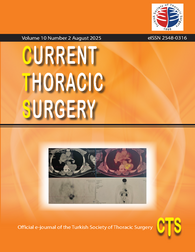2Department of Thoracic Surgery, Ondokuz Mayis University, Medical Faculty, Samsun, Turkey
3Department of Thoracic Surgery, Istanbul Atlas University, Medical Faculty, İstanbul, Turkey DOI : 10.26663/cts.2025.010 Viewed : 1479 - Downloaded : 575 Background: Obesity, defined as a body mass index (BMI) of 30 kg/m² or greater, constitutes a substantial global health concern and is associated with an extensive spectrum of comorbid conditions, including numerous malignancies. Among these, lung cancer presents distinctive challenges, particularly with regard to surgical management. The present study examines the impact of obesity on clinical outcomes - namely, prognosis, postoperative complications, and overall survival - among patients undergoing lobectomy for primary lung cancer.
Materials and Methods: This retrospective analysis was conducted on a cohort of 1,000 patients who underwent lobectomy for lung cancer between 2010 and 2017. Following the application of predefined inclusion criteria-namely, pathological staging limited to 2A through 3A and the exclusion of cases with concurrent malignancies-a total of 71 patients were deemed eligible for the final analysis. Key clinical and perioperative variables were assessed, including body mass index (BMI), incidence of postoperative complications, duration of hospitalization, operative time, smoking history, and overall survival. Statistical analysis was performed using SPSS version 21.0. Group comparisons were conducted using independent samples t-tests for continuous variables with two categories, while one-way analysis of variance (ANOVA) was applied for comparisons involving more than two groups. Categorical data were evaluated using chisquare tests. A two-tailed p-value of less than 0.05 was considered indicative of statistical significance.
Results: Patients classified as obese exhibited a significantly longer postoperative survival duration when compared to individuals with normal or overweight BMI (p < 0.05). The incidence of postoperative complications was also notably lower in the obese group (p < 0.05). However, no statistically significant differences were observed among the BMI categories in terms of hospital stay length or operative time (p > 0.05). Interestingly, the prevalence of smoking was markedly lower among obese patients (p < 0.001). In contrast, among patients who survived less than five years following surgery, BMI was not found to be significantly associated with either extended hospitalization or postoperative complication rates.
Conclusions: The findings of this study highlight a compelling example of the so-called “obesity paradox” within the context of thoracic surgery. Despite the anticipated risks associated with higher BMI and accompanying comorbidities, obese patients demonstrated more favorable postoperative outcomes and improved survival compared to their non-obese counterparts. These results prompt further investigation into the biological and clinical factors contributing to this paradoxical trend, with the aim of better informing perioperative risk stratification and individualized treatment strategies in lung cancer surgery.
Keywords : obesity, body mass index, lung cancer, lobectomy, postoperative complications





